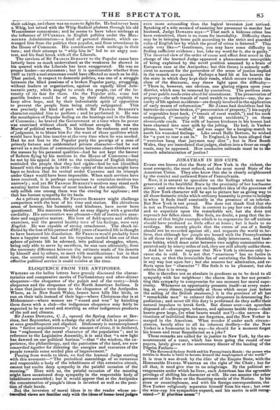ELOQUENCE FROM THE ANTIPODES.
WRITERS on the belles lettres have gravely discussed the charac- teristics and comparative merits of Parliamentary and after-dinner eloquence—the eloquence of the pulpit and of the vestry—Irish eloquence and the eloquence of the North American Indians. It is time that justice were done to the eloquence of the Antipodes. Where, as in New South Wales, beasts have bills like birds, or run on their tails instead of their legs—where Christmas-day is at Midsummer—where women are " wooed and won" by knocking them down with a club—the indigenous eloquence may fairly be expected to be as novel and startling as other indigenous products of the soil and climate.
Sir JAMES Dowrastu, C. J., opened the Spring Assizes at Ber- rima, last September, with a charge the style of which is peculiar— at once grandiloquent and slipshod. Dishonesty is metamorphosed into " furtive acquisitiveness ' ; the amount of crime, it is declared, has " engloorned the moral character of the population"; and in reference to the Legislative Assembly, it is said that "a new light has dawned on our political horizon "—that " the wisdom, the ex- perience, the philanthropy, and the patriotism of the land, are now conscribed together for directing the energies and resources of the people towards some settled plan of improvement." Passing from words to ideas, we find the learned Judge starting with this averment—" The periodical assemblage of so numerous and respectable a body of the inhabitants of this extensive circuit, cannot but excite deep sympathy in the painful occasion of the meeting." Here with us, the painful occasion of the meeting might have occasioned deep sympathy in the respectable body of inhabitants assembled ; but it would appear that at the Antipodes the concatenation of people's ideas is inverted as well as the posi- tion of their heads.
But the inversion of moral ideas is to the reader whose un- travelled views are familiar only with the ideasof home-bred judges
even more astounding than the logical inversion just noticed. Speaking of a wife accused of assisting her paramour to murder her husband, Judge Dowersu says—" That such a hideous crime has been committed, there is no room for incredulity. Difficulty there may be in bringing home guilt according to the strict and guarded rules of English law by which the proof of crime is fettered." This reads very like—" Gentlemen, you may have some difficulty in finding sufficient evidence ; but, take my word for it, she is guilty." The inverted view of the order of cause and effect first noted in the charge of the learned Judge appeared a phwnomenon susceptible of being explained by the novel position assumed by a brain of European race at the Antipodes; but this theory is scarcely suffi- cient to account for the perversion of the sense of justice implied in the remark now quoted. Perhaps a hard hit at his hearers for the state in which they kept their roads, which occurs towards the close of the discourse, may throw light upon the difficulty- " There is, however, one obvious, one glaring stigma upon your district, which may be removed by yourselves. The perilous state of your public roads cries aloud for amendment. The preservation of property—the safe transit of rural wealth to markets—nay, the se- curity of life against accidents—are deeply involved in the application of early means of reformation." Sir JAMES had doubtless had his batterie-de-cuisine broken, (" preservation of property,") his supply of vegetables kept back, (" transit of rural wealth,") and his neck endangered, (" security of life against accidents,") on these abominable roads. The milk of human kindness in his bosom had been churned into sour milk by the jolting. He had, in Yankee phrase, become "wolfish," and was eager for a hanging-match to sooth his wounded feelings. Like sweet Bully Bottom, he wished for "a part to tear a cat in." In England, it has been alleged that "wretches hang that jurymen may dine "; but in New South Wales, they are immolated that judges, shaken into a fever on rough roads, may be appeased. How conducive railroads must be to the smooth administration of justice !


























 Previous page
Previous page